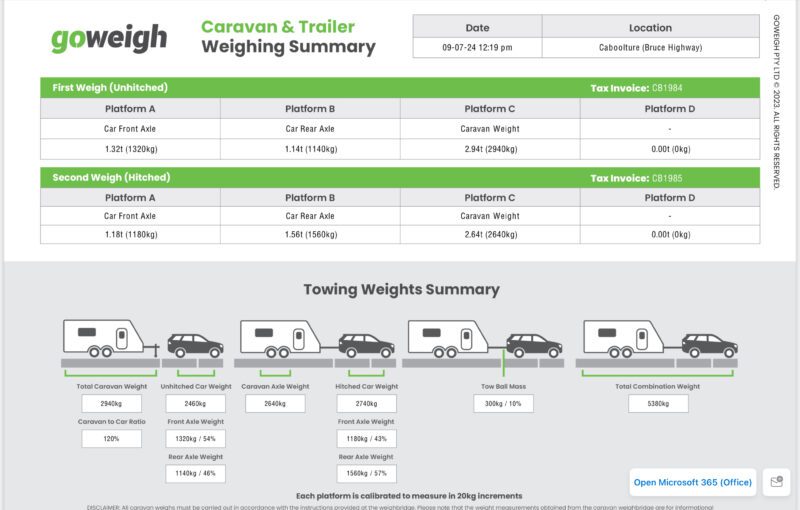Weight Considerations for Your Caravan Adventure
This guide explains key weight considerations for safely towing a caravan, including terms like kerb weight, GVM, and ATM. Learn how to stay within safe towing limits, distribute weight properly, and ensure a balanced, smooth journey. Perfect for both new and experienced caravanners travelling safely
Share
Weight Considerations for Your Caravan Adventure
When choosing a caravan, understanding its weight capacity is crucial for ensuring safe and efficient towing. Most of our caravans can carry an additional 150-200kg, on top of what is supplied all our caravans offering ample space for your belongings. However, if you’re considering a Chinese-built hybrid caravan, be aware that they typically have a lower carrying capacity of around 100kg. To maintain optimal balance while towing, it’s important to distribute additional weight evenly, preferably towards the middle or rear of the caravan.
With our well-equipped caravans, you’re all set for a fantastic adventure! Should you have any specific questions or needs regarding caravan weights, feel free to reach out.
1. Understand Your Towing Limits
Before heading out on the road, it’s vital to know how much weight your vehicle can tow and ensure that the combined weight of your caravan and towing vehicle stays within safe limits. The key here is not just knowing your caravan’s weight but also the various towing capacities and their implications for safety and insurance. We’ve broken down the essential terms below to help you understand what to look for:
Key Towing Weight Terminology
Understanding towing weights is critical for a smooth and safe journey. Here are four key terms you’ll encounter:
KERB WEIGHT
The kerb weight of a vehicle includes the vehicle’s weight with fuel, oil, and the driver, but without any luggage or additional supplies. Think of this as the weight of your vehicle when parked at the curb, ready to drive.
PAYLOAD
The payload is the total weight of everything added to the vehicle on top of the kerb weight. This includes passengers, luggage, and any accessories you pack, as well as the weight transferred to the vehicle from the trailer or caravan’s towball.
GROSS VEHICLE MASS (GVM)
The gross vehicle mass (GVM) is the sum of the kerb weight plus the payload. It represents the total weight of the tow vehicle, including:
• Fuel
• Oil
• Accessories and gear
• Driver and passengers
• The additional towball weight from the caravan or trailer
It’s crucial not to exceed the maximum GVM specified by your vehicle’s manufacturer.
Driving with a GVM above the recommended limit could void your insurance and compromise safety.
GROSS COMBINATION MASS (GCM)
The gross combination mass (GCM) refers to the maximum allowable weight for your fully-loaded vehicle and caravan together. This number is also set by the tow vehicle manufacturer and is an important figure to keep in mind when preparing for your trip.
How to Calculate Caravan Towing Weights
When towing a caravan, you need to keep track of several important weights to ensure your setup is safe. Here’s a breakdown of the key terms for caravan weights:
TARE MASS
The tare mass is the weight of the caravan as it was manufactured, including any factory-installed accessories but excluding any cargo like food, water, or luggage. This is the “empty” weight of the caravan.
AGGREGATE TRAILER MASS (ATM)
The aggregate trailer mass (ATM) is the maximum weight of your fully-loaded caravan, including all items inside it (clothes, bikes, food, water, gas bottles, etc.). The ATM is clearly stated on your caravan’s VIN plate and should never be exceeded.
GROSS TRAILER MASS (GTM)
The gross trailer mass (GTM) is the actual weight of your caravan when it’s loaded and hitched to the tow vehicle. Note that the tow vehicle will bear some of the caravan’s weight due to the towball load.
If your caravan is loaded to its ATM limit, the GTM will be the ATM minus the towball weight.
TOWBALL WEIGHT
The towball weight is the amount of downward force exerted on the towball of your vehicle by the caravan’s hitch. A general guideline is to aim for a towball weight that’s between 7% and 15% of the ATM.
To ensure the right balance, you can measure the towball weight using a set of towball scales. If the weight is off, you can adjust the load distribution inside your caravan to achieve a proper balance.
How to Ensure Safe Towing Capacity
To ensure you’re within safe towing limits, visit a weighbridge after loading your caravan and tow vehicle. We recommend GoWeigh located at Caboolture Service centre North Bound. Here’s a step-by-step process for checking your weight:
1. Weigh the Tow Vehicle: Start by weighing your empty, unhitched tow vehicle to make sure it doesn’t exceed the GVM.
2. Weigh the Combined Vehicle and Caravan: Next, hitch the caravan and drive the fully-loaded setup onto the weighbridge. This checks if you’re within the Gross Combination Mass (GCM) limit.
3. Check the Gross Trailer Mass (GTM): Drive forward, leaving your tow vehicle off the weighbridge. With the caravan still hitched, this will give you the GTM, which should not exceed the caravan’s ATM.
4. Weigh the Caravan Alone: Finally, unhitch the tow vehicle and weigh the fully-loaded caravan. Ensure it’s within the Aggregate Trailer Mass (ATM) limit.
If your weights exceed the limits at any point, you may need to redistribute your load or adjust your packing. A caravan that’s overpacked or improperly balanced can create safety hazards and legal issues.
Final Thoughts
Properly managing your caravan’s weight is essential for safe and enjoyable travel. By understanding the key towing weight terms and regularly checking your vehicle and caravan’s combined weight, you can avoid costly mistakes and ensure a smooth, legal, and stress-free journey. Remember, safety always comes first – happy towing!

